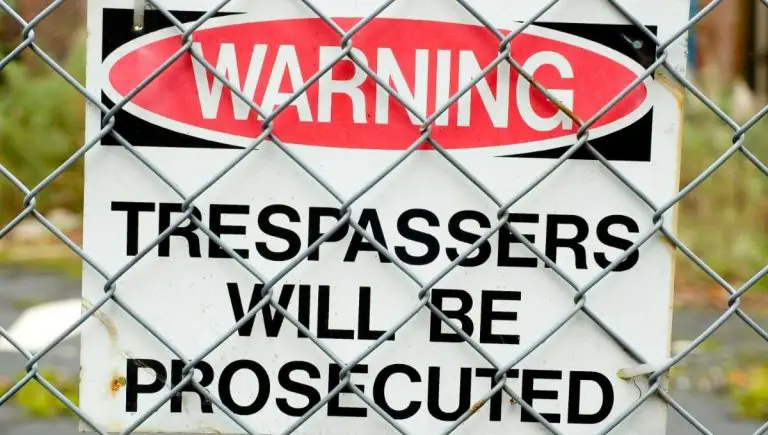Can a Restraining Order Against a Neighbor Force Them to Move?

Not all people are fortunate enough to have considerate and kind neighbors. Others just get on your nerves or worse, they can be threatening. If you’re no longer safe in your home because of your neighbor, you might want to file a restraining order. So, can a restraining order against a neighbor force them to move?
Getting a restraining order against a neighbor can force them to move, however this depends on the distance between you and your neighbors house. Restraining orders can protect you from your neighbor at a certain distance. If the distance between you and your neighbor is within the distance specified on the restraining order, then he or she will have to move until the order is lifted.
Keep in mind that you can’t just bring the police in and start taking legal action right away. Getting a restraining order against your neighbor may be complicated because of the proximity of your living spaces.
You’ll need to provide enough proof that your neighbor is a real threat in order to make this happen.
With that being said, this is something that can be done, and in this article we’ll discuss what you can do to maintain a safe distance from your neighbor using retraining orders.
DISCLAIMER: We are not a law firm and this article is not written to substitute legal advice. Always consult an attorney.
Can a Restraining Order Force Someone To Move?
Conflicts between neighbors are common and sometimes inevitable. It can stem from different kinds of issues. Perhaps you might be annoyed at your neighbor who always throws drunken parties and when you call them out, you start getting threats. Maybe you’ve witnessed something that your neighbor didn’t want you to witness and has since become aggressive toward you.
Even an argument between parking in front of your house or their house can escalate. Whatever the reason may be, a neighbor can react aggressively and abusively toward you. If you continue to feel threatened, you may need to file a civil harassment restraining order.
Understanding Civil Harassment Restraining Order
You can’t file a standard domestic violence restraining order against your neighbor despite the violent threats he or she is making against you. Domestic violence restraining order only applies to people who fear for their safety because of someone who has a close relationship with them, such as a lover, a spouse, or even a family member.
But that doesn’t mean someone else, other than a close relative or a lover, can’t make your life difficult even in your own home. The civil harassment restraining order can be the solution to stop the harassment you’re experiencing from your neighbor. One of the effects of this type of restraining order is that it can force them to move away from you as far as possible.
You might also enjoy our post on How to Shut Down Your Neighbors Airbnb
How To Get a Restraining Order Against Your Neighbor
If your neighbor’s behavior toward you becomes too concerning, it’s time to consider a neighbor harassment restraining order and get the help of a lawyer. In this case, you may need to fill out appropriate forms and take the matter to court. Your lawyer should be able to help you through the process.
What Is Considered Harassment From a Neighbor?
As mentioned, you can’t just decide that a neighbor should stay away from you just because you “feel” he or she is a threat. It’s not about hearing something awful your neighbor said about you; it’s not also about how thoughtless his or her comments are about you.
If you have a dispute and there is actual harassment, you need to show evidence that your neighbor’s presence threatens your safety. The best way you can prove that you are being harassed is by providing the court with all the details you have. You need to be specific with your evidence – videos, sound recordings, witnesses, and police reports.
But what does it really mean to be harassed by a neighbor? Are you’re dealing with a crazy neighbor that repeatedly calls the police on you for no reason?
Harassment by a neighbor means repeated intentional acts. Common examples include:
- Noise complaints — when your neighbor keeps playing extremely loud music at any time of the day. Note that there are those who still intend to harass you with loud music, but the level of sound is within acceptable limits.
- Animal complaints — if your neighbor intently ignores the fecal matter his or her dog left on your property or repeatedly violates leash laws, or if the pet is allowed to physically attack
- Bullying — this can also apply to children and may come in the form of verbal or physical.
- Boundary issues — this becomes a common dispute between neighbors who don’t seem to agree clearly on property lines
- Nuisance complaints — if the neighbor refuses to clean up the property, as required by city ordinances.
- Threats and violence — threats of violence and assault include verbal harassment, sexual contact, or any form of physical contact.
If you’re confused about what constitutes harassment, just remember that this involves intention – harassment is always done with intention. However, this may be challenging enough to prove to the court. Usually, you can tell if it’s intentional but just make sure you have proof.
My Neighbor Put a Restraining Order On Me
It’s not uncommon for the tables to be turned. What happens if you’re issued a restraining order by your neighbor? And worse, what if your neighbor is the harasser, yet, you’re the one who has the restraining order filed against?
Many people have been asking advice on forums in case their neighbor filed a restraining order against them even with no hard evidence. This only shows that this is commonly happening.
There is even a story about a person who ended up in the hospital after an argument with a neighbor. At the end of the day, that person ended up receiving a restraining order. This is possible and it may be unfair but it can happen because of a temporary restraining order.
Can Someone File a Restraining Order Without Proof?
As previously mentioned, if you want to file a restraining order against your neighbor, you need solid proof to give to the judge. But then you question, how come your neighbor (and the actual harasser) was able to get a restraining order against you even if you did absolutely nothing wrong?
Your neighbor may have gotten a temporary restraining order, which doesn’t really require evidence to be approved. This is because, generally, the court would rather stay cautious and apologize to someone for a mistaken restraining order than denying a request for a restraining order that might result in someone’s demise.
If your neighbor has managed to file a temporary protective order, the best thing to do is to lawyer up and don’t try to fix the problem on your own.
Can I Text Someone If I Have a Restraining Order Against Them?
When you have a restraining order against someone, that person should refrain from contacting you or getting near you within certain restraining order proximity. But what about texting? Is texting a violation of a restraining order?
To answer the question, yes, texting is a violation of the order. However, you can still text the person you have a protective order against. At the same time, your neighbor can still contact you even if he has a restraining order against you.
There is no violation on the part of the protected person if he or she sends a text to the restrained individual. But as a reminder, the text should be properly documented as this can be presented to the judge and be used to vacate the order.
When you are on the receiving end of the text, do keep in mind that it’s best for you to not respond to the texts. Or better yet, it’s better to call the police and inform them that you are receiving a text from the protected person.
What’s important to know is that you should not let your emotions get the best of you when receiving the text. Be careful not to get carried away by responding. If an argument ensues, you will surely be in big trouble.
Do I Have To Go To Court For a Restraining Order Against Me?
So now you have been burdened by your neighbor who got a restraining order against you. What should be your next move? Should you show up in court? What are the usual process to go about this situation?
Here are the general steps involved in a restraining order process:
- The person wanting to be protected will fill out court forms that request for a civil harassment restraining order.
- The judge will decide to make the order, sooner or later. A hearing date will then be scheduled.
- If the judge grants the request, a temporary restraining order will be issued against you until the hearing date.
So yes, you need to show up to court if you have a restraining order against you. Until then, as the restrained person, you shouldn’t have any contact with the protected person. This means no phone calls or e-mails, or even texts.
At the same time, you will be ordered to stay away from the person, so make sure you don’t get anywhere near them.
Restraining Order Against Me: What Are My Rights?
Although restraining orders serve as a protection for the harassed individual, not all of them are granted based on tangible pieces of evidence. It’s not uncommon for a person to be a subject of false allegations just so the other individual can file a restraining order against him or her.
If there is a restraining order against you and you know so well that your neighbor conjured up those allegations, he/she will use these claims to control the entire situation. Once the temporary restraining order has been granted, and you violate the requests, there will be serious consequences.
If you feel your rights are being threatened, you need to take action immediately and contact a lawyer to help you get the order vacated. As the restrained person, you will be notified of the request to appear in court.
You will be given the chance and the right to defend yourself. You have the right to lawyer up, so it’s best to get one.
As you’re ironing out the situation, it’s also a good idea to do the following:
- Gather solid proof relating to the incidents stated in the order
- Collect documents that will prove your whereabouts during those times your neighbor may have complained about you.
- Gather possible witnesses who might share important information relating to the events and the petitioner.
What If Someone Lies To Get a Restraining Order?
It is not an uncommon situation for someone to lie about events just to get a restraining order. This happens a lot – and if you’re in that situation, here’s what you can do.
You have to appear in court and disprove all those lies with solid evidence to have the restraining order vacated. The courts will look at the evidence and not just hearsay.
As mentioned, it’s likely that your neighbor has a temporary restraining order against you. In that case, show up to court. Otherwise, this will turn into a permanent order.
Consequences For Lying On a Restraining Order
Nothing really big happens to the complainant if he or she lies. Technically, they are subjecting themselves to a perjury case but that is rarely prosecuted. It’s likely that prosecutors have far better things to do than catch anyone who lies under oath.
If you’re expecting your neighbor to pay fines or get jailed for lying, that’s not likely to happen. Instead, when the lies have been proven, your order will be vacated and your neighbor’s lies will be exposed.
When the time comes your neighbor wants to file another restraining order, he or she might have it difficult because of a past record of lies.
What Happens If You Get a Restraining Order Against Your Neighbor?
When you get a civil harassment restraining order against a neighbor. Your neighbor might stop bothering you, because he or she may have already moved out after being issued a restraining order.
It’s also worth noting that your neighbor’s life might change just because there was a restraining order against him. In the next section, we will discuss the effects of having a restraining order – whether it was filed against you or against your neighbor.
Effects Of Having a Restraining Order
While there is no exact number of cases of restraining orders made available, it is estimated to be in millions every year in the U.S. Without a doubt, it has major effects on someone else’s life.
If you file a restraining order against someone, or if someone has filed it against you, it’s best to be aware of the consequences restraining orders have in your life. Being aware helps you deal with the situation and stay out of trouble, as much as possible.
The first thing to note is that restraining orders do not automatically equate to criminal charges. However, the complainant can take it up a notch and file criminal charges against you. That said, you’ll know that you’ll be in serious trouble if it escalates.
But even without criminal charges, there are negative effects of a restraining order. In this section, we will discuss some of the questions that you might ask regarding the effects.
How Long Does a Restraining Order Stay On Record?
A temporary restraining order should only be in effect for no longer than ten days. It can be renewed for an additional ten days. It won’t show up on your criminal record, unless you violated an order and a criminal charge was filed against you.
Will a Restraining Order Show Up On a Background Check?
Background checks are conducted for several reasons. It could be done when you’re applying for a new job, if you wish to rent an apartment, or if you want to join the military. Checks are also done to see if you are qualified to participate in certain programs or receive benefits.
So will having a restraining order against you show up in those checks? Yes and no. General background checks done by employers or a landlord will not reveal your restraining order. In contrast, the order will show up if the checks are done for military or security clearance purposes.
Does a Restraining Order Affect Your Credit
Yes, it will and you’ll most likely have trouble applying for a loan or credit. The company could go deeper into their check on an applicant, going as far as obtaining court records.
Even if the restraining order application was denied or even if the allegations were unfounded, this will have a negative impact on your credit application. In this case, it would be best for you to explain in the best possible way that the order was not granted at all.
Does a Restraining Order Affect My Ability To Rent?
On the bright side, no, restraining orders will not affect anyone’s ability to rent a living space. As mentioned before, if a landlord wishes to do a background check on a tenant, the history of restraining orders will not show up.
Will a Restraining Order Affect My Employment?
A temporary restraining order will less likely show up on your record, so you will not have any issues with employment. However, if your order became permanent and was registered with law enforcement, then that would be a big problem.
This will still depend on the nature of job you have or you plan to apply for. The impact can be profound if you apply for jobs that require thorough checks such as a government job or a youth mentor.
Does a Restraining Order Affect My Ability To Work?
Generally, restraining orders should not affect your ability to work and your boss might never know about it, unless the person who filed a complaint against you is your colleague.
For example, if the order requests you to stay at least 100 yards away from your colleague, then your boss may decide to fire you. In addition, if your work requires you to carry a gun, and there’s a restraining order against you (which means you can no longer carry a gun), then your employer may need to fire you as well.
Does a Restraining Order Ruin Your Life?
With some of the obvious negative impacts of restraining orders, it can be said that yes, a restraining order can ruin your life. You could lose your job, your residence, or even relationships. In such trying times, it’s best to work with a lawyer so you can get through it.
Conclusion: Can a Restraining Order Against a Neighbor Force Them to Move?
Neighbor disputes can happen and it’s unfortunate if you have a nasty neighbor. If the neighbor’s behavior continues to appall you or reaches to the point that it threatens you, filing a restraining order can be helpful.
A restraining order against a neighbor can force them to move out, until such time that the order has been lifted. Just make sure that you provide enough solid evidence to request for a restraining order against someone who lives near you.






